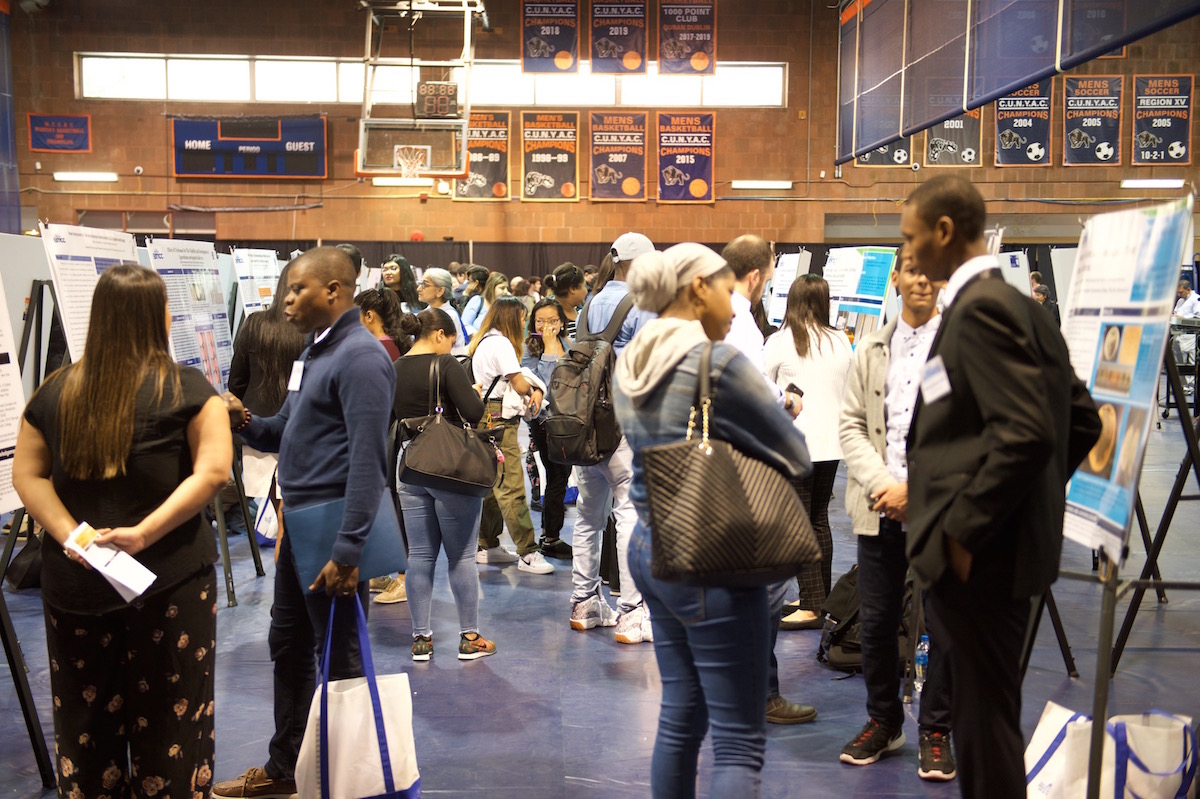
May 9, 2019
On May 8, the 2019 Borough of Manhattan Community College (BMCC/CUNY) Annual Research Symposium (BARS) presented a poster presentation session that highlighted the research projects of more than 125 students working with almost 50 professors.
Guided by their mentors, students investigate correlations between Instagram use and interpersonal relationships, assistive robotics for deaf-hearing communications, using pupil size to decode perception in motion-induced blindness, the pressure-resistance of flexible foams, the biological activity of guavas, and more.
“This event demonstrates the unique undergraduate research opportunities at BMCC, made possible by the dedication and academic excellence of our faculty, as well as the talent and commitment of our students,” says Karrin E. Wilks, BMCC interim president in her message in the BARS brochure. “I am thoroughly impressed with the caliber and significant outcomes of your research. These activities are not only expanding and developing your own education and career preparation, but also contributing to a rich and thriving research community at BMCC.”
The poster session has out-grown its original home—Richard Harris Terrace — and was held in the college’s gymnasium. More than 300 people attended this year’s event.
This year’s keynote speaker was Alison Dell, associate professor in the Department of Neuroscience at the University of Pennsylvania and a visual artist whose work reflects concepts from her research into cellular and molecular biology, neuroscience and environmental science and policy.
Dell is the co-founder of Art in the Lab, an ongoing project that brings scientists and artists together for events that mix drawing and laboratory work. She talked about her research at Newtown Creek, the 3.5-mile long tributary of the East River, is an estuary that forms part of the border between Brooklyn and Queens.
The robust participation not only shows how dedicated BMCC faculty are to mentoring students in research and incorporating student researchers into their projects according to Jim Berg, associate dean of faculty at BMCC.
This sort of research helps students identify their areas of interest and build the skills they need to pursue their academic goals. “Students at a poster presentation have to be able to visually represent their work, and at the same time, be able to talk to people one-on-one or in small groups about what they’ve learned,” said Berg.
Science major Justin Miller’s presentation focused on the Bioactivity in Resveratrol, a chemical found in red wine, red grape skins, purple grape juice, mulberries, and peanuts and has been shown to have anti-inflammatory properties.
Miller, who also worked with science major Wajiha Zafar and was mentored by Science Professor Alexander Gosslau, explained that chronic inflammation has been linked to cancer, among other diseases. “In essence, we’re looking to use preventative measures to stop cancer from even starting,” he said.
Miller’s dream is to someday have a lab of his own, where he can conduct research on cancer prevention.
“BMCC has prepared me for the next level. We use cutting edge-tools and materials, and my professor is widely known,” he said.
BARS also presented five BMCC research projects with the Distinguished Poster Award. They include:
Justin Miller and Wajiha Zafar
Mentor: Alexander Gosslau, Ph.D
Discipline: Science
Title: Bioactivity of Resveratrol
Program: CUNY Research Scholars Program (CRSP)
Nadjet Cornejal
Mentor: José Fernández Romero, Ph.D
Discipline: Science
Title: Human Vaginal Fluid Components Do Not Interfere with Griffithsin Anti-HIV Properties.
Program: CUNY Research Scholars Program (CRSP)
Claudia Melo
Mentor: Adolfina Koroch, Ph.D, Christine Priano, Ph.D, and José Fernández Romero, Ph.D
Discipline: Science
Title: Biological Activity of Guava (Psidium guajava)
Program: CUNY Research Scholars Program (CRSP)
Lizbet Ferrante and Zubair Al-Zaabi
Mentor: Lalitha Jayant, Ph.D
Discipline: Science
Title: Effect of Common Microbial Agent Triclosan on the Viability and Development of Sea Urchin Embryos
Program: Minority Science and Engineering Improvement Program (MSEIP)
Chris Clouse
Mentor: Miguel Fiolhais, Ph.D
Discipline: Science
Title: The effects of beamsstrahlung and initial state radiation on efficiency of a kinematic reconstruction of top quark pair dilepton events
Program: Collegiate Science and Technology Entry Program (CSTEP)
Ongoing research opportunities at BMCC
At BMCC, students benefit from multiple research opportunities housed in departments as varied as the Center for Ethnic studies, Health Education, Modern Languages, Science and Business.
These opportunities often provide stipends for student researchers who work closely with their professors who are principal investigators on state- and federally funded grants provided through the BMCC Foundation Fund for Undergraduate Research, the Louis Stokes Allied Minority Participation (LSAMP), the CUNY Research Scholars Program (CRSP) and others.
Resources for faculty researchers include the BMCC Office of Research and Scholarly Inquiry, which provides training and support for faculty and student researchers. For more information, call (212) 220-8320, Ext. 7980.
Another resource is the BMCC Office of Sponsored Programs, which offers a wide range of resources to faculty and staff as they search for external funding, develop proposals and manage funded projects. For more information, call (212) 220-8010.
STORY HIGHLIGHTS
- 2019 BMCC Annual Research Symposium (BARS) fills the BMCC gymnasium with posters showcasing the work of more than 125 student researchers
- Students in faculty-led research projects are mentored in lab protocols, science concepts, presentation skills and more
- Keynote speaker Alison Dell, founder of Art in the Lab, shared her work bringing scientists and artists together in interdisciplinary creative projects

